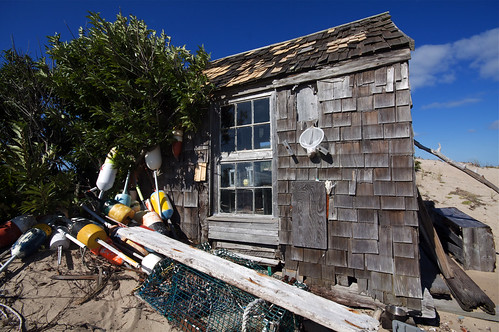I said "when I'm alive no more
"And my soul at last goes free,
"You'll find me walking on the dunes
"And down beside the sea."
Dune-Revenant
Harry Kemp
Tramp Poet of the Dunes
1883-1960

 Cabaña de Harry Kemp
Cabaña de Harry Kemp
Seaside Talkers (Provincetown Summer of 1917)
They drank the bitter, salt wine of the sea,
They breathed up drowning bubbles from below
While we sat in the storm's red after-glow
Discussing Art and Love - sipping tea.
I was a poet, he, an artist; she,
A famous actress . . . lightly to and fro
We shuttled epigrams as salesmen show
Rich silks that change in colors momently.
And while the fishers clung to planks and spars
And rode the huge backs of waves, we sat
Beneath a young night full of summer stars:
And we discussed of life this way and that
Until we felt, when we arose for bed,
That there was nothing left had not been said.
Harry Kemp
Harry Hibbard Kemp (15 December 1883 – 8 August 1960) was an American poet and prose writer of the twentieth century. He was known as (and promoted himself as) "the "Vagabond Poet, the Villon of America, the Hobo Poet, or the Tramp Poet," and was a well-known popular literary figure of his era, the "hero of adolescent Americans."
Kemp was born in Youngstown, Ohio, the only son of a candymaker. He was raised by his grandmother, in a house by the local train yards. At the age of seventeen he left home to become a common seaman; after returning to the United States he traveled across the country by riding the rails as a hobo. He later attended the University of Kansas, and while a student he began publishing verse in newspapers and magazines. He spent much of his maturity traveling; he stayed in a number of planned communities for varying lengths of time, then wrote autobiographical novels about his experiences. Kemps Tramping on Life: An Autobiographical Narrative (1922) was one of the best selling "tramp autobiographies" of the 1900-1939 period. When not traveling he was a regular denizen of Greenwich Village in New York City and Provincetown on Cape Cod in Massachusetts, where he was associated with the Provincetown Players. There is a street named for him, Harry Kemp Way, in Provincetown, MA. Harry Kemp was also known as the "poet of the dunes." Kemp lived on and off in a shack in the dunes of Provincetwon, Cape Cod for a period of about 40 years, and he died there in 1960. A 1934 Kemp poem titled, "The Last Return," was written for the Coast Guard men who have steadfastly worked to save the lives of those shipwrecked on Cape Cod's coast.
Kemp had a knack for self-promotion, what he called "the Art of Spectacularism," and early learned to collaborate with and manipulate journalists to attract attention to his work. He spent time in Paris in the early 1920s, along with the more famous members of the Lost Generation.
Kemp knew many of the bohemian and progressive literary and cultural figures of his generation, including Elbert Hubbard, Upton Sinclair, Ida Tarbell, Bernarr MacFadden, Sinclair Lewis, Max Eastman, Eugene O'Neill, Edmund Wilson, John Dos Passos, E. E. Cummings, and many others. Kemp played a role in the first stage production of O'Neill's earliest play. Kemp was physically imposing, "Tall, broad-shouldered, and robust," and gained a reputation as a lover, sometimes of other men's wives; he was involved in various scandals throughout his career. His part in Upton Sinclair's divorce was especially notorious in its day.
In addition to his original books, Kemp translated a play by Tirso de Molina as The Love-Rogue (1923), and edited The Bronze Treasury (1927), "an anthology of 81 obscure English poets." Kemp's views turned somewhat more conservative with age; he rejected leftist and anarchist sympathies and wrote approvingly of Jesus as the "divine hobo" and the "super tramp."
Kemp's reputation had declined into obscurity by the time of his death in 1960; but his role in the history of modern American literature and the American left has brought renewed interest and further publication of his work.





No hay comentarios:
Publicar un comentario